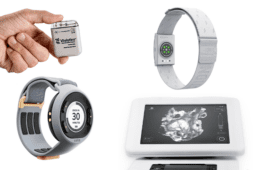Boston Scientific Corporation has conducted the first implant in the clinical trial of the next generation ACUITY X4 left-ventricular (LV) pacing leads and RELIANCE 4-FRONT defibrillation (ICD) leads. The clinical trial is designed to establish the safety and effectiveness of both lead families and is intended to support U.S. Food and Drug Administration (FDA) approval of these devices.
ACUITY X4 LV leads are quadripolar leads engineered to maximize effectiveness and minimize unnecessary patient interventions after implant. The unique three-dimensional spiral design is intended to minimize floating electrodes resulting in better electrical performance; in addition, dual-fixation zones and the 2.6 French crossing profile are designed to optimize lead stability and reduce the risk of dislodgement. When an ACUITY X4 lead is connected to a Boston Scientific X4 CRT-D, the resulting 17 pacing vector options are designed to improve physicians’ ability to manage unexpected complications electronically through programming rather than an invasive lead revision.
The RELIANCE 4-FRONT ICD lead is designed for reliability and performance over the long term. The lead maintains the same design principles as the industry’s most reliable ICD lead, the ENDOTAK RELIANCE lead, yet offers improved handling and maneuverability. Additionally, the GORE coating securely adhered to the defibrillation coils is intended to prevent tissue in-growth and enable both a streamlined implant experience and easier extraction in case of infection.
“For the past 20 years, Boston Scientific has led the industry with regard to lead reliability and performance,” said Kenneth Stein, M.D., senior vice president and chief medical officer, Rhythm Management, Boston Scientific. “The ACUITY X4 and RELIANCE 4-FRONT leads are designed to continue this tradition and will provide physicians better options to improve patient care.”
The first patient enrollments occurred this week at Wheeling Hospital in Wheeling, W.VA with Dr. Maninder Bedi, and at Central Baptist Hospital in Lexington, KY with Dr. Aaron Hesselson. “The ACUITY X4 portfolio allowed me to choose a lead that matched the patient’s anatomy,” said Dr. Hesselson.
Likewise, Dr. Bedi noted the advantages of the ACUITY X4 portfolio for his patient. “This patient may have otherwise had to go for an epicardial lead due to the lack of placement options, but the X4 lead got into several branches of a narrow anatomy that other leads may not have been able to access,” said Dr. Bedi.
The NAVIGATE X4 trial is a prospective, non-randomized, multi-center, global clinical study designed to support FDA approval. The two principal investigators are Suneet Mittal, MD, director, Electrophysiology, Valley Health System and Martin C. Burke, DO, professor of medicine and director, Heart Rhythm Center, University of Chicago Medical Center. The trial is expected to enroll between 1,542 and 2,290 patients at up to 125 centers in the United States, Canada and Israel. The ACUITY X4 and RELIANCE 4-FRONT leads will be connected to commercially-available Boston Scientific X4 CRT-D devices.
Leads are insulated wires that connect an implantable device to the heart for treatment of sudden cardiac arrest or heart failure. Cardiac Resynchronization Therapy Defibrillation (CRT-D) devices work in conjunction with leads to sense and stimulate (or pace) both right and left ventricles, thus resynchronizing the heart to provide appropriate function. Quadripolar CRT-D systems help physicians address high-pacing capture thresholds and phrenic nerve stimulation, a common complication of CRT therapy due to close proximity of the phrenic nerve to the desired pacing location in the left ventricle.
The ACUITY X4 left ventricular pacing leads and RELIANCE 4-FRONT defibrillator leads are CE Marked. In the United States, they are investigational devices and not available for sale.
For more information, visit Boston Scientific.




